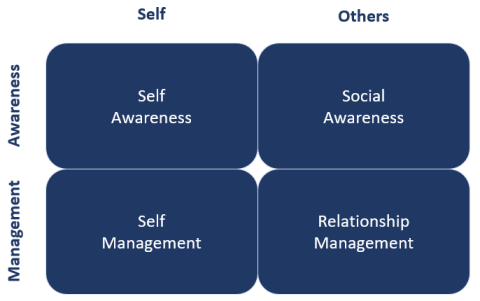By Tyler Reimschisel, MD
As I mentioned in my last article, for the next several months, I will devote the articles in the Tips for High-Impact Teamwork series to the topic of emotional regulation within teams. Emotional intelligence (EI) is the starting conceptual framework for this discussion because I view it as a cornerstone of teamwork. Case Western Reserve’s Weatherhead School of Management, one of the leaders in the field of EI, defines it as the ability to understand, motivate and develop ourselves and others (Emotional Intelligence – the Weatherhead Way).
The four core competencies or dimensions of emotional intelligence are typically explained using a two-by-two table like the one shown here.
The top row of competencies represents “awareness,” and the bottom row represents “management.” In addition, the left-sided column represents the “self” or individual realm, and the right-sided column represents “others” with whom the individuals interact. This conceptual framework nicely depicts the four core skills of EI: self-awareness, self-management, social awareness and relationship management. Let’s unpack each of these competencies.
Self-awareness is the lifelong process of knowing yourself as you really are. This competency requires a lot of self-reflection because it involves being aware of your range of emotions in various situations. It includes developing a better understanding of why you feel certain emotions in certain settings, who and what your triggers are, what your values are and how you react under stress. In addition, this skill encompasses knowing how others perceive you, and growth in this competency necessitates getting feedback from others about how they experience you.
Self-management builds on self-awareness. It is choosing how you respond to the emotions you are experiencing. In addition to self-control, self-management involves sensing subtle twinges or early warning signs about emotions that could hijack your actions if they are not kept in check and modulating them before they become problematic. It also includes important teamwork skills like adaptability and resilience.
A key component of the definition of EI is self-motivation. Effective self-management involves motivating yourself to actively engage in an interaction, task, relationship or other experience. In other words, individuals who are always negative or have a persistently bad attitude are not manifesting effective self-management skills.
“When you understand your own emotions and can respond to them the way you choose to, you have the power to take control of difficult situations, reacting nimbly to change, and take the initiative needed to achieve your goals,” (Bradberry and Greaves, 2009).
Simple, yet effective, strategies to help achieve growth in this competency include:
- Mindfulness practices
- Devoting time to problem-solving
- Controlling self-talk
- Imagining yourself succeeding, and
- Seeking help from someone who self-manages well.
We will explore these areas of EI in more detail during this series.
Social awareness, the third competency of EI, is the ability to recognize and accurately interpret the emotions of others. It includes appreciating the moods of other people or groups and having empathy toward them. Who wants to be alone? Who wants to chat? Who needs someone just to be with them? Who needs a hug or a gentle embrace? It also means having the presence of mind to notice another person’s body language and tone of voice, then accurately interpreting their deeper emotions and how they are doing in the present moment. As I have written previously, (Our Sixth Sense and Other Partial Truths), it is prudent to have a healthy skepticism of the accuracy of our intuition since we are frequently erroneous about what we think others are thinking and feeling yet are largely overconfident about the accuracy of our beliefs.
The fourth and final EI competency is relationship management, and it requires effective utilization of the other three EI competencies. Relationship management involves your influence on others and how you impact your relationship with them. I actually prefer referring to this dimension as “relationship influence” instead of “relationship management” as we don’t really manage as much as influence relationships. For example, how we lead a team or serve as a mentor or coach is included in this skill. Our ability to manage conflicts productively is also a component of this competency. Strategies to foster better skills within the relationship management competency include being curious, working on building trust with others and your teams and giving and receiving feedback effectively. It includes validating the emotions and perspectives of others, even when you do not agree with them. Remember that the perspectives of others and the feelings they are having are valid simply because they are theirs, and validation of those perspectives and feelings does not equate with agreement or endorsement.
What role do the four competencies of EI play in teamwork? Based on one study, fully two-thirds of the abilities that were deemed essential for effective performance by corporate managers were emotional competencies (Rosier, 1994). In another study, compared to their average-performing peers, superior-performing mid-level managers in research and development showed more EI competencies (Dreyfus, 2008). Whereas cognitive intelligence is a threshold ability for effective performance, EI is frequently a key factor in distinguishing the best of the best. In my experience working with teams, emotional regulation is one of the most challenging aspects of EI. As I mentioned earlier, we will be exploring this topic in future articles this fall and winter.
References:
Bradberry, T and Greaves, J. Emotional Intelligence 2.0. TalentSmartEQ, 2009.
Christian, K. How to Have Difficult Conversations about Race: Practical Tools for Necessary Change in the Workplace and Beyond. BenBella Books, 2022:31-33.
Dreyfus C. “Identifying competencies that predict effectiveness of research and development managers.” Journal of Management Development, 2008;27(1):76-91.
Rosier RH, Ed. The Competency Model Handbook, Volume 1. Linkage Incorporated, 1994.
Weatherhead School of Management Executive Education. Emotional Intelligence – the Weatherhead Way. Retrieved September 4, 2024



